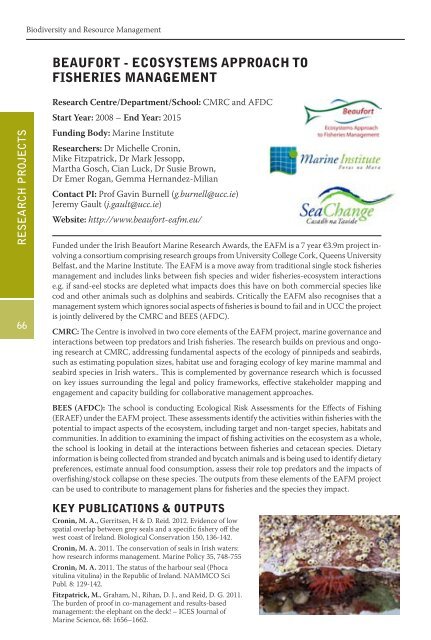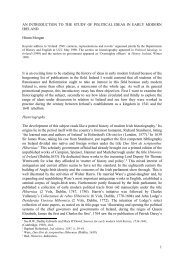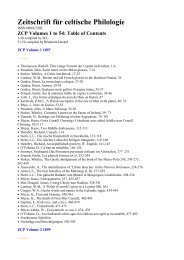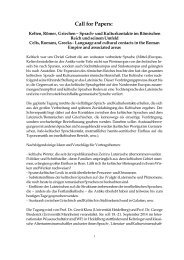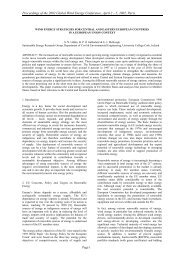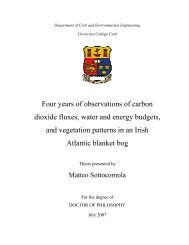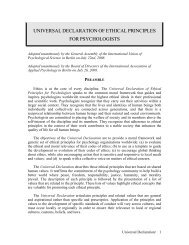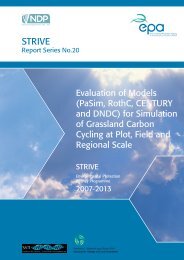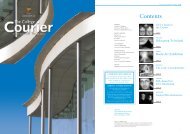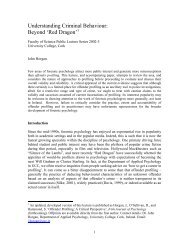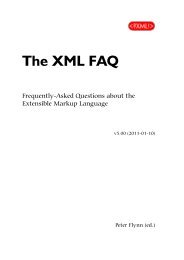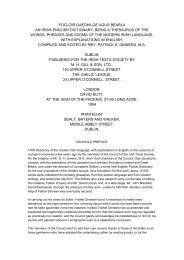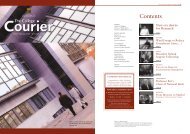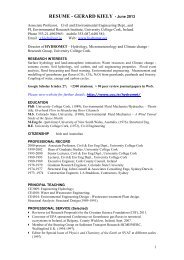2013 - University College Cork
2013 - University College Cork
2013 - University College Cork
Create successful ePaper yourself
Turn your PDF publications into a flip-book with our unique Google optimized e-Paper software.
RESEARCH PROJECTS<br />
66<br />
Biodiversity and Resource Management<br />
BEAUFORT - ECOSYSTEMS APPROACH TO<br />
FISHERIES MANAGEMENT<br />
Research Centre/Department/School: CMRC and AFDC<br />
Start Year: 2008 – End Year: 2015<br />
Funding Body: Marine Institute<br />
Researchers: Dr Michelle Cronin,<br />
Mike Fitzpatrick, Dr Mark Jessopp,<br />
Martha Gosch, Cian Luck, Dr Susie Brown,<br />
Dr Emer Rogan, Gemma Hernandez-Milian<br />
Contact PI: Prof Gavin Burnell (g.burnell@ucc.ie)<br />
Jeremy Gault (j.gault@ucc.ie)<br />
Website: http://www.beaufort-eafm.eu/<br />
Funded under the Irish Beaufort Marine Research Awards, the EAFM is a 7 year €3.9m project involving<br />
a consortium comprising research groups from <strong>University</strong> <strong>College</strong> <strong>Cork</strong>, Queens <strong>University</strong><br />
Belfast, and the Marine Institute. The EAFM is a move away from traditional single stock fisheries<br />
management and includes links between fish species and wider fisheries-ecosystem interactions<br />
e.g. if sand-eel stocks are depleted what impacts does this have on both commercial species like<br />
cod and other animals such as dolphins and seabirds. Critically the EAFM also recognises that a<br />
management system which ignores social aspects of fisheries is bound to fail and in UCC the project<br />
is jointly delivered by the CMRC and BEES (AFDC).<br />
CMRC: The Centre is involved in two core elements of the EAFM project, marine governance and<br />
interactions between top predators and Irish fisheries. The research builds on previous and ongoing<br />
research at CMRC, addressing fundamental aspects of the ecology of pinnipeds and seabirds,<br />
such as estimating population sizes, habitat use and foraging ecology of key marine mammal and<br />
seabird species in Irish waters.. This is complemented by governance research which is focussed<br />
on key issues surrounding the legal and policy frameworks, effective stakeholder mapping and<br />
engagement and capacity building for collaborative management approaches.<br />
BEES (AFDC): The school is conducting Ecological Risk Assessments for the Effects of Fishing<br />
(ERAEF) under the EAFM project. These assessments identify the activities within fisheries with the<br />
potential to impact aspects of the ecosystem, including target and non-target species, habitats and<br />
communities. In addition to examining the impact of fishing activities on the ecosystem as a whole,<br />
the school is looking in detail at the interactions between fisheries and cetacean species. Dietary<br />
information is being collected from stranded and bycatch animals and is being used to identify dietary<br />
preferences, estimate annual food consumption, assess their role top predators and the impacts of<br />
overfishing/stock collapse on these species. The outputs from these elements of the EAFM project<br />
can be used to contribute to management plans for fisheries and the species they impact.<br />
KEY PUBLICATIONS & OUTPUTS<br />
Cronin, M. A., Gerritsen, H & D. Reid. 2012. Evidence of low<br />
spatial overlap between grey seals and a specific fishery off the<br />
west coast of Ireland. Biological Conservation 150, 136-142.<br />
Cronin, M. A. 2011. The conservation of seals in Irish waters:<br />
how research informs management. Marine Policy 35, 748-755<br />
Cronin, M. A. 2011. The status of the harbour seal (Phoca<br />
vitulina vitulina) in the Republic of Ireland. NAMMCO Sci<br />
Publ. 8: 129-142.<br />
Fitzpatrick, M., Graham, N., Rihan, D. J., and Reid, D. G. 2011.<br />
The burden of proof in co-management and results-based<br />
management: the elephant on the deck! – ICES Journal of<br />
Marine Science, 68: 1656–1662.


